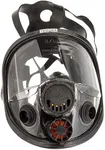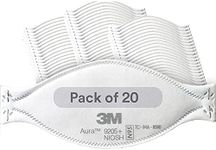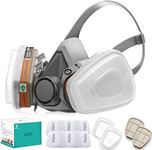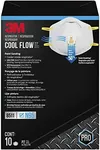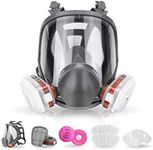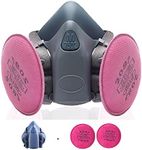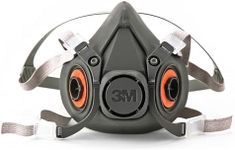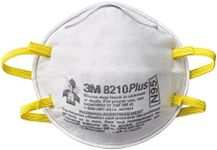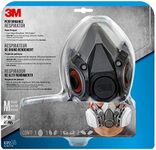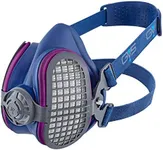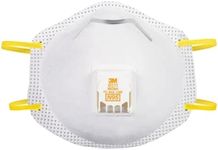Buying Guide for the Best Respirator Masks
Choosing the right respirator mask is important for your health and safety, whether you need it for work, home projects, or protection from airborne particles. The best mask for you depends on what you need protection from, how long you'll wear it, and how comfortable it feels. Understanding the key features will help you make a smart choice that keeps you safe and comfortable.Filtration EfficiencyFiltration efficiency tells you how well the mask can filter out particles from the air. This is important because it determines what kinds of hazards the mask can protect you from, such as dust, fumes, or viruses. Masks are often rated by percentages (like 95% or 99%) or by standards (like N95 or P100). Lower efficiency masks (around 80-90%) are suitable for basic dust or pollen, while higher efficiency masks (95% and above) are needed for finer particles or more dangerous contaminants. Think about what you need protection from—if it's just dust from cleaning, a lower rating may be fine, but for hazardous chemicals or viruses, go for the highest efficiency you can.
Type of RespiratorThere are different types of respirators, such as disposable masks, half-face reusable masks, and full-face masks. Disposable masks are lightweight and meant for short-term use, good for simple tasks. Half-face reusable masks cover your nose and mouth and can be fitted with different filters, making them more versatile for various jobs. Full-face masks also protect your eyes and are best for more dangerous environments. Choose the type based on how often you’ll use it and what level of protection you need—occasional light use calls for disposables, while regular or high-risk use is better with reusable or full-face options.
Fit and SealA good fit and seal are crucial because even the best filter won’t protect you if air leaks around the edges. Masks come in different sizes and shapes, and some have adjustable straps or nose clips to help you get a snug fit. If you wear glasses or have facial hair, you may need to try different styles to find one that seals well. Always check that the mask fits tightly to your face without gaps, especially if you need high protection.
Breathability and ComfortBreathability refers to how easy it is to breathe through the mask. This is important if you need to wear the mask for long periods or while doing physical work. Some masks have exhalation valves to make breathing easier, but these may not be suitable in situations where you need to protect others from your breath. Comfort features like soft materials, padded edges, and adjustable straps can make a big difference if you’ll be wearing the mask for hours. Think about how long and how often you’ll wear the mask, and choose one that won’t make you uncomfortable.
Filter Type and ReplaceabilitySome respirators use built-in filters, while others have replaceable cartridges or filters. Built-in filters are simple and disposable, but you have to throw away the whole mask when it’s used up. Replaceable filters are more cost-effective for regular use and let you switch filters for different hazards. Check what kinds of filters are available and how easy they are to change. If you need protection from specific chemicals or gases, make sure the mask can use the right type of filter.
Certification and StandardsRespirator masks are often certified by organizations to meet certain safety standards, like NIOSH (in the US) or EN (in Europe). These certifications mean the mask has been tested for effectiveness. Always look for masks that meet recognized standards for your region, especially if you need protection from serious hazards. This ensures you’re getting a mask that actually does what it claims.

